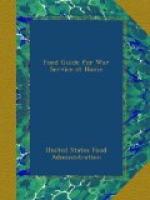Eggs form a very valuable food not only for protein, but for mineral salts and vitamines as well. It is unfortunate that the price is often high, but it should be realized that expenditure for eggs makes expenditure for meat unnecessary.
Poultry is not now listed as a meat substitute by the Food Administration because the supply has become very limited.
Cheese is one of the best substitutes for meat. It represents most of the food value of a much greater bulk of milk, and its protein, fat, and mineral salts make it an important food. We in America are very slow to appreciate it. We are apt to use it in small quantity for its flavor rather than as a real food. We could well eat more of it, to the advantage both of the palatability and nutritive quality of our diet.
Milk, one of the most easily digested and simplest sources of protein in our diet and the most valuable of our foods, is discussed in Chapter VII.
Nuts are usually thought of as a luxury, but the amount of protein and fat they contain makes them really an important food. Peanuts are usually classed with the nuts and are considered the most valuable nut-crop of the United States. They are growing so fast in importance that the acreage was increased 60 per cent in 1917. They are used for oil and for fodder as well as for human food. Peanut-butter or a bag of peanuts is a good investment, but it should be counted as part of the necessary food, not eaten as an extra. The occasional indigestion following injudicious eating of cheese and nuts is probably often due to forgetting that they are very substantial foods and eating them at the end of an already sufficient meal.
Peas and Beans are taken up with the other vegetables in Chapter VIII.
Why do not the Allies use these substitutes? Mainly because they haven’t them. Dairy products are as scarce as meat. All the fish and beans and peas that they can get are being used. But it is not enough. THEIR SMALL MEAT RATION MUST BE MAINTAINED, AND THEIR ARMIES AS WELL AS OURS MUST HAVE MEAT. KEEP IT GOING OVER!
CHAPTER V
FATS
To a person who has been in Europe since the war began the question of the importance of fats is no longer debatable. Having practically gone without them, he knows they are important. In Germany it is the lack of fat that is the cause, perhaps, of the most discomfort and makes the German most dissatisfied with his rations. Even when the diet was sufficient, it was not satisfactory if low in fat.
This dependence on fat in the diet is due to several reasons, both physiological and psychological. Some people, the Japanese for example, habitually eat but little. But it is the habit of both Europeans and Americans to use considerable fat both on the table and in cooking. The taste of food is not so pleasing without it. Their recipes almost all use fat in one form or another, so that when little or none is available, a change must be made in most of the methods of cooking. Practically all food must be boiled, and is lacking in the flavor and texture to which we are accustomed. The food, no matter how nutritious it may be, will not taste good.




